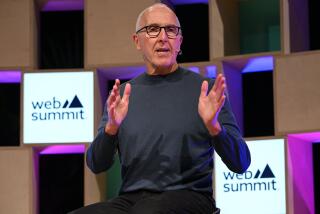Private System Linking Globe by Satellite Planned
- Share via
Two Information Age entrepreneurs who already have earned massive fortunes in telephone and computer technology are teaming up to build what they hope will be a $9-billion worldwide satellite communications network.
The venture, backed by computer software whiz William H. Gates and cellular telephone executive Craig O. McCaw, would economically bring two-way voice and digital communication to isolated communities around the globe beyond the reach of traditional land-based telephone lines. If successful, the venture would create the biggest and most ambitious satellite system to date.
Gates is chairman of Microsoft Corp., the world’s largest computer software company, and McCaw founded McCaw Cellular Communications, the largest cellular telephone company.
Their joint venture, to be called Teledesic Corp., based in Kirkland, Wash., plans to launch 840 small satellites over the next seven years so that it can begin offering the service worldwide by 2001. It expects to file its proposal for the service with the Federal Communications Commission today.
Though the network has been under design for nearly four years, the financing for the ambitious system has not yet been worked out, said Russell Daggatt, a communications lawyer who is president of Teledesic.
Daggatt said the company hopes to attract investment from telecommunications equipment manufacturers and governments of countries that lack broad communications networks.
“The design is fairly advanced from a technological standpoint,” Daggatt said in a telephone interview from Washington, D.C. “To actually do it requires broad international cooperation. It is beyond the ability of two individuals, beyond any company or country, to do it alone.”
“It is a very, very vast undertaking, with lots of manufacturers and service providers pulling together,” said Robert A. Ratliffe, McCaw’s vice president for communications.
Teledesic would not be the first such venture, though as planned it would be by far the most extensive satellite network. Motorola Corp. is building a $3.3-billion system, called Iridium, that would rely on 66 satellites.
As envisioned, the Teledesic network would provide telephone communications, computer linkages and two-way video conferences between any two points in the world.
“Think of it as a global Internet,” Daggatt said, referring to the highly popular computer communications network.
Daggatt said that the satellite network would not deliver entertainment services or television programming, but would concentrate on providing educational and medical information and communication.
He said that Gates and McCaw together own about 30% of Teledesic, though he declined to say how much each man had invested or what the company is worth. He said that McCaw Cellular owns a smaller piece of the company, and a Los Angeles venture fund headed by telecommunications engineer Edward Tuck owns about 10%. Daggatt credited Tuck with first “inspiring the technical effort” and getting the investors involved.
Daggatt said that the ownership stakes in the venture would be diluted as new partners come on board.
According to a spokesman for Microsoft, that software company is not directly involved.
“This is apparently something that Bill is doing on his own,” Microsoft spokesman Marty Taucher said.
Daggatt said the design challenge was to develop a system that was comprehensive yet affordable, suitable for linking the far reaches of the Amazon as well as isolated pockets of rural Montana. He said that the design has been discussed and reviewed among scientists, including those at the National Aeronautics and Space Administration’s Jet Propulsion Laboratory in Pasadena.
Ratliffe said the system is viewed as a link between the Information Age haves and have-nots. “Craig has a strong feelings about bringing communications to remote parts of the world, and it is in that spirit that they are doing it.”
Gates co-founded Microsoft and built it into a software behemoth. His personal fortune is estimated at $7 billion, making him the second-richest man in America behind investor Warren Buffett.
McCaw also has built a vast personal fortune as well as a corporate powerhouse. His company is in the process of being acquired by American Telephone & Telegraph Co. for $12.6 billion.
More to Read
Sign up for Essential California
The most important California stories and recommendations in your inbox every morning.
You may occasionally receive promotional content from the Los Angeles Times.













